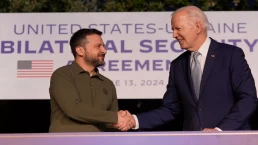During Biden’s term, Democrats have become the party promoting war and overseas conflict.
By Norman Solomon, The Hill
While analyzing the tailspin of the Biden presidency and the failed campaign of Kamala Harris, few pundits have questioned that militarism is a political necessity as well as a vital tool of U.S. foreign policy.
Harris checked a standard box at the Democratic National Convention when she pledged to maintain “the strongest, most lethal fighting force in the world.” Yet the erosion of the Democratic Party’s base is partly due to the alienation of voters who don’t want to cast their ballot for what they see as a war party.
That perception is especially acute among the young, and notable among African Americans. Many have viewed President Biden’s resolute support for the Israeli war in Gaza as a moral collapse. When Harris remained loyal to it during the fall campaign, her credibility sank.

Events in recent weeks have done nothing to reassure those repelled by the Democratic administration’s approach. Biden’s purported 30-day deadline for Israel to start allowing adequate food into Gaza expired shortly after the election — without Israeli compliance — while the humanitarian disaster in Gaza actually became worse than ever. Biden’s White House pretended otherwise.
The ongoing hellish realities for Palestinian civilians in Gaza caused 40 percent of Senate Democrats to vote for Sen. Bernie Sanders’ (I-Vt.) post-election resolution to block $20 billion worth of military aid to Israel. But near the end of November, Biden followed up by greenlighting an additional $680 million in arms sales to Israel. While Republicans remained in lockstep for arming Israel, the budding dissent from congressional Democrats remained ineffectual.
On Ukraine war policy, dissent has been rare from Democratic lawmakers. Two years ago, 30 progressive House Democrats sent a letter to Biden that suggested “a proactive diplomatic push” could be useful for achieving a ceasefire — but they quickly withdrew the letter after an angry backlash from hawkish leaders in their own party. (Republican lawmakers are split on Ukraine policy — many want the U.S. to recklessly confront China instead of Russia.)
Recent Posts
A War With Iran Would Not Be a One-Off Event But a Disastrous Ongoing Rupture
February 26, 2026
Take Action Now If Congress cedes its power to stop a war with Iran, it will fully erode any lingering promise of democratic restraint.By Hanieh…
New Addition to List of Nuclear Near Catastrophes
February 25, 2026
Take Action Now Debris flew for great distances — many times the distance of 270 meters to a nuclear reactor and nuclear storage facility.By David…
Gavin Newsom’s last budget belies his ‘California for All’ pledge
February 24, 2026
Take Action Now Yet, even as the state is poised to lose billions in federal funding, and millions of Californians are losing access to health care…
Israel and American Hawks are Pushing U.S. to Iran War With Catastrophic Consequences
February 23, 2026
Take Action Now At the World Health Assembly in May, member states may endorse an unprecedented strategy declaring that health is not a cost – but…




